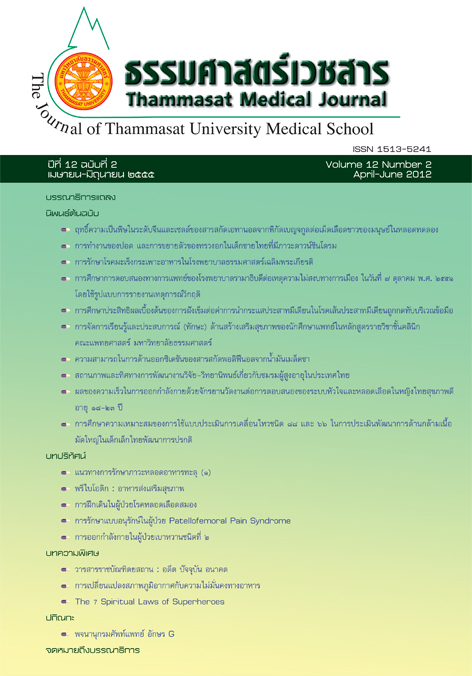The Effect of Needle Acupuncture on Nerve Conduction Study of the Median Nerve in Patients with Carpal Tunnel Syndrome: A Randomized Controlled Trial: A Preliminary Study
Keywords:
การฝังเข็ม, ค่าการนำกระแสประสาทมีเดียน, โรคเส้นประสาทมีเดียนถูกกดทับบริเวณข้อมือ, Needle acupuncture, Nerve conduction study of median nerve, Carpal tunnel syndromeAbstract
Objectives: To study the effectiveness of needle acupuncture on nerve conduction study of the median nerve in patients with carpal tunnel syndrome by comparing the difference in latency and amplitude of sensory nerve action potential (SNAP) and compound nerve action potentials (CMAPS). The study also examines the difference in symptom intensity and treatment satisfaction using a Boston questionnaire which was translated into Thai and was administered one month before and one month after the procedure.
Study design: A randomized single-blinded controlled trial
Setting: Outpatient Department, Thammasat Hospital
Subjects: Twenty - six patients with mild to moderate carpal tunnel syndrome
Methods: Patients were randomized into 2 groups: the intervention group (received needle acupuncture treatment) and the control group (didn’t receive needle acupuncture). Both groups were given standard conservative treatment.
Results: There were 11 patients in the intervention group and 15 patients in the control group. No statistical difference was found in demographic data between both groups (p>0.05). The latency of SNAP and CMAPS one month before and one month after in both groups had improved but there was no signifi cant statistical difference (p>0.05). The amplitude of SNAP and CMAPS in the acupuncture group had decreased while in the control group it had improved but there was still no signifi cant statistical difference (p>0.05). Symptom intensity on the Boston questionnaire at 0, and 1 month were decreased in both groups and has signifi cant statistic difference between both groups (p≤0.05). Using hands in activities on a Thai Boston questionnaire was better in acupuncture group but was worse in control group and also has significant statistic difference between both groups (p≤0.05). Treatment satisfaction on a numeric rating scale, in acupuncture group was better than control group but no signifi cant statistic difference (p>0.05).
Conclusions: One-month treatment of carpal tunnel syndrome by needle acupuncture can improve nerve conduction study of median nerve like standard treatment. However, symptom intensity and using hands in activities are better than standard treatment.
Key words: Needle acupuncture, Nerve conduction study of median nerve, Carpal tunnel syndrome



